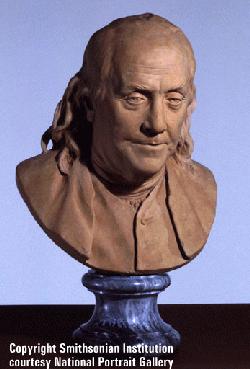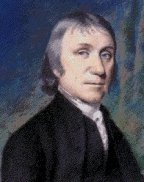Benjamin Franklin and the Early Scientific Vision - 1780
In 1780, from his residence in France, Benjamin
Franklin (he then being the American Ambassador to that kingdom) wrote
the letter, below, to the English natural philosopher, Joseph Priestley.
The quotation (highlighted in blue) is cited frequently in the history
of life-extension.
| Dear Sir, Passy,
Feb.8, 1780
Your kind Letter of Sept. 27. came to hand but very lately, the Bearer
having staid long in Holland.
I always rejoice to hear of your being still employ'd in Experimental
Researches into Nature, and of the Success you meet with. The
rapid Progress true Science now makes, occasions my Regretting sometimes
that I was born so soon. It is impossible to imagine the Height to which
may be carried in a 1000 Years the Power of Man over Matter. We may perhaps
learn to deprive large Masses of their Gravity & give them absolute
Levity, for the sake of easy Transport. Agriculture may diminish its Labour
& double its Produce. All Diseases may by sure means be prevented or
cured, not excepting even that of Old Age, and our Lives lengthened at
pleasure even beyond the antediluvian Standard. O that moral Science were
in as fair a Way of Improvement, that Men would cease to be Wolves to one
another, and the human Beings would at length learn what they now improperly
call Humanity.-
I am glad my little Paper on the Aurora Borealis pleas'd. If it should
occasion farther Enquiry, & so produce a better Hypothesis, it will
not be wholly useless -
I am ever, with the greatest & most sincere Esteem, Dear Sir, Yours
very affectionately - BF
Reference. Oberg, B (Editor) The Papers of Benjamin Franklin,
Vol 31, page 455-456, Yale Univ. Press 1995. |
 Ben Franklin
Ben Franklin
by Jean-Antoine Houdon 1778
National Portrait Gallery
http://www.npg.si.edu
Accession Number: NPG.76.40 |
Several aspects of this communication are of interest.
First, Franklin predicts that in 1,000 years we will be able to transport
large masses and double the agricultural yield. In his day, only animals
and rudimentary mechanical pulleys were available to augment manpower.
Alleviating toil was a major ambition of civilization from ancient times
to the present. For example, Henry Ford, in the early 20th Century, was
originally driven by the ambition to invent a "mechanical horse"
(later termed "tractor") to release the farmer from a life of
drudgery and to increase agricultural production. Those two predictions
have been fulfilled beyond Franklin's most wild imagination. And in terms
of disease prevention, medicine, and life-extension, the fulfillment of
this science is imminent. The prediction that these event would be realized
within a 1,000 years is characteristic in human psychology. Somehow, regardless
of how well informed a person may be, the future always seems very far
away. When Franklin refers to the prospect of "our Lives lengthened
at pleasure even beyond the antediluvian Standard" he means the mythical
lives of the Hebrew patriarchs in the Torah or Old Testament.
| Patriarch |
Age of death |
| Adam |
925 |
| Seth |
925 |
| Enoch |
905 |
| Kenan |
910 |
| Mahalalel |
895 |
| Jared |
962 |
| Methuselah |
969 |
| Lemach |
777 |
| Noah |
950 |
| Genesis Ch. 5 ver. 1-32 and Ch. 9 ver. 28 |
The letter of Priestley to which Franklin is responding
is interesting in itself; and the full text is provided in the pop-up box
below.
 Joseph Priestley (1733-1804), one
of the foremost figures in the history of science (see biographical links
1 &
2),
begins his letter by acknowledging that Franklin is "much engaged
in affairs of more consequences", by which he must be referring to
the fact that Franklin was, at the time, the American Ambassador to France
and a central figure in America's revolution against England, Priestley's
country. It is intriguing that both gentlemen, as citizens, would technically
be at war with each other but, personally, retain the highest collegial
relationship. Also, Priestley ends his letter with comments about his funding
situation - obviously, a perennial conundrum of scientists.
Joseph Priestley (1733-1804), one
of the foremost figures in the history of science (see biographical links
1 &
2),
begins his letter by acknowledging that Franklin is "much engaged
in affairs of more consequences", by which he must be referring to
the fact that Franklin was, at the time, the American Ambassador to France
and a central figure in America's revolution against England, Priestley's
country. It is intriguing that both gentlemen, as citizens, would technically
be at war with each other but, personally, retain the highest collegial
relationship. Also, Priestley ends his letter with comments about his funding
situation - obviously, a perennial conundrum of scientists.
